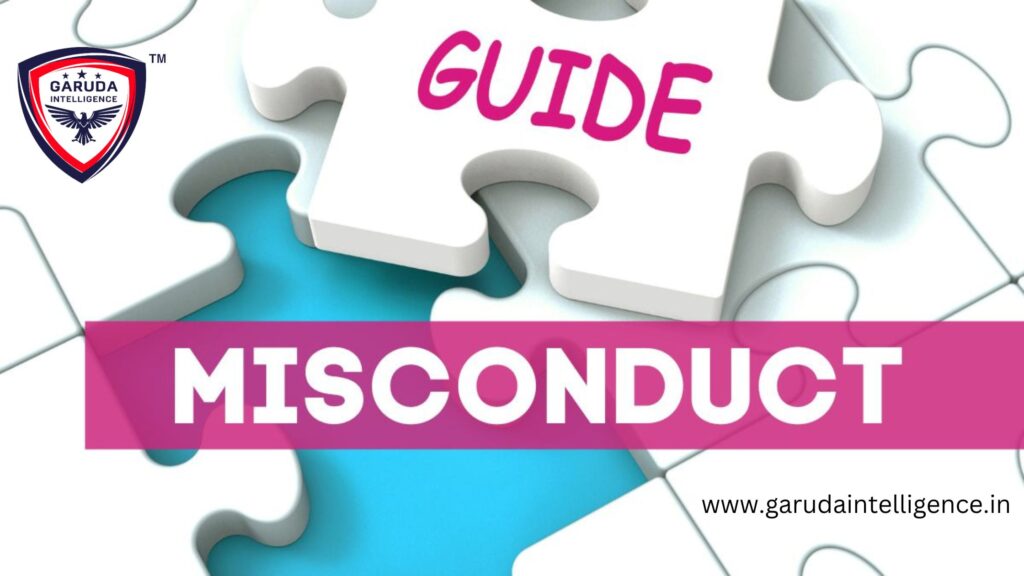-
info@garudaintelligence.in
Send Email
-
No.2/28, 2nd Floor,Opp to DLF IT Park, Ramapuram, Chennai -89
Visit Our Office
+91 93630 90901
Confidentiality Guaranteed
+91 93630 90901
Confidentiality Guaranteed
Blog Details
-
Garuda Intelligence > Blog > corporate investigaation > The Complete Guide to Understanding Employee Misconduct in the Workplace
Oct
The Complete Guide to Understanding Employee Misconduct in the Workplace
Understanding Employee Misconduct:
Employee misconduct is a critical issue that can significantly disrupt workplace dynamics, reduce productivity, and harm organizational culture. To effectively mitigate its occurrence, both employers and employees must clearly understand what constitutes misconduct, its various forms, and the potential consequences of such actions. A proactive approach to addressing misconduct can help maintain a positive workplace environment, protecting the organization’s reputation and ensuring its long-term success.
One effective way to enhance monitoring and prevention of employee misconduct is through the use of smart surveillance and advanced safety systems. Garuda Intelligence, a leading provider of innovative safety solutions, offers powerful tools that help organizations identify and manage employee behavior, improving overall workplace security and integrity.

Definition of Employee Misconduct
Employee misconduct refers to any action or behavior that violates company policies, procedures, or ethical guidelines. Such actions can adversely affect the organization, its employees, or its clients. Misconduct can take on several forms, including violations of legal, ethical, and professional standards. It is essential for companies to have clear policies that define what constitutes misconduct and communicate these to all employees.
Types of Misconduct in the Workplace
Employee misconduct can be broadly categorized into four primary types:
- Professional Misconduct
- Ethical Misconduct
- Legal Misconduct
- Behavioral Misconduct
Let’s take a closer look at each of these categories:
1. Professional Misconduct
Professional misconduct refers to actions that directly violate an employee’s job responsibilities or company policies. This type of misconduct can impact the overall performance and efficiency of the organization, making it one of the most common and serious forms of workplace misconduct.
Examples of Professional Misconduct:
- Negligence: When an employee consistently fails to perform their duties to the required standard, it can lead to missed deadlines, lower quality of work, and dissatisfied clients or customers.
- Unauthorized Absence or Chronic Tardiness: Excessive absenteeism or habitual lateness without valid reasons can disrupt workflows and place additional burdens on other team members.
- Misuse of Company Resources: Using company equipment, such as vehicles, computers, or financial assets, for personal gain is a direct violation of company policies.
- Falsification of Records: Manipulating reports, altering timesheets, or providing false information can lead to severe consequences, such as financial losses and legal repercussions.
- Breach of Confidentiality: Unauthorized sharing of sensitive company information can damage an organization’s reputation and expose it to legal risks.
2. Ethical Misconduct
Ethical misconduct involves violating moral principles or ethical standards set by the company or industry. Ethical violations can erode trust among employees, clients, and other stakeholders, making it crucial for organizations to uphold high ethical standards.
Examples of Ethical Misconduct:
- Conflicts of Interest: When an employee’s personal interests conflict with the company’s objectives, it can lead to biased decisions and undermine the organization’s goals.
- Accepting Bribes or Kickbacks: Employees accepting gifts, favors, or money in exchange for preferential treatment or services is not only unethical but also illegal in many cases.
- Misrepresentation of Qualifications: Lying about qualifications or exaggerating experience on a job application or resume can lead to unqualified individuals taking on roles they are not equipped to handle.
- Dishonesty in Business Dealings: Providing false information to clients, overbilling, or engaging in deceptive business practices can severely damage a company’s credibility and lead to legal action.
- Discrimination and Harassment: Unethical behavior that includes discrimination based on race, gender, religion, or any other protected characteristic, as well as any form of harassment, can result in lawsuits and damage employee morale.
3. Legal Misconduct
Legal misconduct occurs when an employee engages in behavior that violates local, state, or federal laws. Such actions not only damage the company’s reputation but can also result in legal consequences, including fines, penalties, or lawsuits.
Examples of Legal Misconduct:
- Theft or Embezzlement: Employees stealing money, equipment, or other assets from the company can lead to significant financial losses.
- Fraud: Engaging in fraudulent activities, such as falsifying financial statements or insurance claims, is a serious legal violation that can lead to criminal charges.
- Insider Trading: Using confidential company information to engage in stock trading or other financial activities is illegal and can result in severe penalties for both the individual and the organization.
- Violation of Safety Regulations: Failing to comply with workplace safety laws and regulations can put employees at risk of injury and expose the company to lawsuits and fines.
- Intellectual Property Infringement: Using another company’s intellectual property without permission, such as copying software, designs, or trademarks, can result in legal disputes and financial penalties.
4. Behavioral Misconduct
Behavioral misconduct refers to actions that negatively affect the work environment or disrupt relationships between employees. This type of misconduct can have a detrimental impact on team dynamics, employee morale, and the overall workplace culture.
Examples of Behavioral Misconduct:
- Bullying and Intimidation: Creating a hostile work environment through aggressive or demeaning behavior can lead to low morale, high turnover, and legal complaints.
- Insubordination: Refusing to follow reasonable instructions from a supervisor or openly defying company policies is a serious issue that can lead to disciplinary action.
- Substance Abuse: Using drugs or alcohol while at work can impair an employee’s ability to perform their job safely and effectively, putting others at risk and leading to potential accidents or injuries.
- Inappropriate Use of Social Media: Posting inappropriate or offensive content on social media platforms that reflects poorly on the company can damage its public image and result in disciplinary action against the employee.
- Verbal or Physical Altercations: Engaging in arguments or physical fights with colleagues creates a toxic environment and can lead to legal consequences for both the individuals involved and the organization.
Consequences of Employee Misconduct
Employee misconduct can have a wide range of consequences, depending on the severity of the offense and the organization’s policies. Consequences for employees may include:
- Verbal or Written Warnings: For minor infractions, employers may issue warnings to inform employees that their behavior is unacceptable and must change.
- Suspension: In more severe cases, employees may be temporarily suspended without pay while an investigation is conducted.
- Demotion: Employees who commit misconduct may be demoted to a lower position within the company, often accompanied by a reduction in salary or responsibilities.
- Termination: In cases of severe or repeated misconduct, an employee may be dismissed from their role entirely.
- Legal Action: If the misconduct involves criminal activity or legal violations, such as fraud or theft, employees may face legal consequences, including fines or imprisonment.
Preventing Employee Misconduct
While misconduct cannot always be entirely prevented, there are steps that organizations can take to reduce its occurrence and create a more positive work environment.
1. Clear Policies and Procedures
One of the most effective ways to prevent misconduct is by having clear, well-communicated policies and procedures in place. Employees should be made aware of the company’s expectations regarding behavior, ethics, and legal compliance, as well as the consequences for failing to meet these standards. Regular training sessions can help reinforce these policies and ensure that employees understand their responsibilities.
2. Employee Training
Training programs focused on ethics, workplace behavior, and compliance with legal standards can help prevent misconduct by educating employees about the importance of adhering to company policies. Ongoing training sessions can also ensure that employees remain informed about any updates to company policies or changes in legal regulations.
3. Open Communication Channels
Creating a workplace culture that encourages open communication between employees and management can help identify potential issues before they escalate into serious misconduct. Employees should feel comfortable reporting concerns or misconduct without fear of retaliation. Having a formal whistleblowing process in place can further encourage employees to come forward with concerns.
4. Leadership by Example
Managers and leaders play a critical role in preventing misconduct by setting a positive example for their employees. When leadership demonstrates integrity, adherence to company policies, and respect for others, it sets the tone for the entire organization. Leading by example can help create a culture of accountability and professionalism.
5. Regular Performance Reviews
Conducting regular performance reviews provides an opportunity for managers to address any concerns regarding an employee’s behavior or performance. These reviews allow for constructive feedback and offer a chance to correct potential misconduct before it leads to more significant issues.
Leveraging Garuda Intelligence for a Safer Workplace
Preventing and addressing employee misconduct is essential for maintaining a healthy, productive work environment. This is where Garuda Intelligence can play a critical role in safeguarding your organization. Garuda Intelligence provides cutting-edge surveillance and monitoring systems designed to identify early signs of misconduct, ensuring that issues are detected before they escalate.
From advanced fire alarm systems to real-time security monitoring solutions, Garuda Intelligence offers comprehensive tools that help protect your business from potential risks. Their systems can be integrated seamlessly into any workplace, enabling managers to monitor employee behavior and identify any violations in real-time.
By incorporating Garuda Intelligence’s solutions, companies can maintain high levels of integrity, professionalism, and safety, reducing the likelihood of legal issues and ensuring employee accountability.
Call to Action
Don’t wait until employee misconduct becomes a serious problem in your organization. Take proactive steps to protect your workplace with Garuda Intelligence today. Contact us to learn more about how our innovative surveillance, fire safety systems, and monitoring solutions can help you create a safe, compliant, and productive work environment.
Ensure your organization is protected. Reach out to Garuda Intelligence today and start building a safer, more responsible workplace.
-
Tags
- background check companies background verification companies Best Detective agency Best Detective agency in Chennai Best Detective Agency in India Detective agency Detective agency in Chennai Detective Agency in India Employee Misconduct Employment Verification Companies How to find employee misconduct How to solve Employee Miscontsct Problem Private Detective in Chennai
Recent Posts
- Garuda Intelligence: Your Trusted Partner for Comprehensive Intelligence Services in Chennai
- The Complete Guide to Understanding Employee Misconduct in the Workplace
- Uncovering Internal Fraud: A Comprehensive Guide by Garuda Intelligence
- Internal Fraud Investigations: Detect, Investigate, and Prevent Corporate Crime
- Enhance Your Hiring Process with Effective Corporate Background Checks
